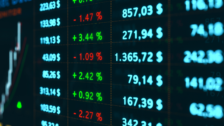Pandemic shift turns ‘temporary’ into structural growth
The value renaissance has been the topic du jour in the financial press since the vaccine-led recovery began in November 2020. After decades of underperformance, a short but powerful rally has taken some of the ‘lustre’ off growth stocks, says Francyne Mu, portfolio manager of the Franklin Global Growth Fund.
The Global Growth strategy, which implements a high-conviction approach to investing into high-quality, fast-growing companies, recently reached $1 billion in assets under management, joining stablemate, the Franklin Absolute Return Bond fund, in the billion-dollar cohort.
The result is another vote of confidence for a strategy that delivered market-leading returns amid the pandemic in 2020, resulting in the fund winning the Global Equities Fund of the Year award issued by research house Morningstar. All the more powerful was the fact that the strong performance was achieved without an exposure to the highly popular FAANG stocks.
The question now, however, is where to from here?
Are we set for a decade of outperformance by ‘value’ over ‘growth’? Is growth overvalued in a rising bond yield environment? According to Mu, the thesis for growth investing is ‘as strong as ever’. She highlights a growing misconception that ‘temporary tailwinds’ like online shopping during lockdowns were just that, temporary, pointing to evidence that they may well be structural.
Commenting on the opportunity set, Mu explains she has the same level of conviction today as during the worst of the pandemic. The key trends of focus for Franklin are e-commerce, cyber-security, online education and digital payments, with Mu noting that the “pandemic served to accelerate” these trends, but that they also remain “well-positioned for substantial growth.”
Commenting on the growing opportunity set in cyber-security, she notes that the Work-From-Homr shift that occurred will result in more flexible work “sticking” as companies are forced to build more mobile workforces.
“To capitalise on these long-term secular growth trends, we employ in-depth, bottom-up research to uncover high-quality growth companies that have both the technological and operational prowess to build lasting competitive advantages in these areas,” she says.
It is this focus on innovation and competitive advantages that sees the strategy differ significantly from many of the most popular global equity strategies in Australia.










